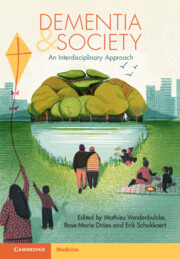Book contents
- Dementia and Society
- Dementia and Society
- Copyright page
- Contents
- Contributors
- Additional material
- Preface
- Chapter 1 Different Perspectives on Dementia
- Chapter 2 From History to Intervention
- Chapter 3 Personhood, Identity and Autonomy
- Chapter 4 Living Meaningfully with Dementia
- Chapter 5 Quality of Life of Persons with Dementia
- Chapter 6 Living with Dementia
- Chapter 7 Informal Care for Persons with Dementia
- Chapter 8 Risk Factors and Non-Pharmacological Prevention of Dementia
- Chapter 9 An Empowering Dementia Environment
- Chapter 10 The Impact of the COVID-19 Pandemic on the Well-Being of People Living with Dementia
- Chapter 11 Care Planning and the Lived Experience of Dementia
- Chapter 12 Societal and Ethical Views on End-of-Life Decisions in Dementia
- Chapter 13 Driving and Dementia
- Chapter 14 Social and Private Costs of Dementia
- Index
- References
Chapter 7 - Informal Care for Persons with Dementia
Characteristics and Evidence-Based Support Interventions
Published online by Cambridge University Press: 26 May 2022
- Dementia and Society
- Dementia and Society
- Copyright page
- Contents
- Contributors
- Additional material
- Preface
- Chapter 1 Different Perspectives on Dementia
- Chapter 2 From History to Intervention
- Chapter 3 Personhood, Identity and Autonomy
- Chapter 4 Living Meaningfully with Dementia
- Chapter 5 Quality of Life of Persons with Dementia
- Chapter 6 Living with Dementia
- Chapter 7 Informal Care for Persons with Dementia
- Chapter 8 Risk Factors and Non-Pharmacological Prevention of Dementia
- Chapter 9 An Empowering Dementia Environment
- Chapter 10 The Impact of the COVID-19 Pandemic on the Well-Being of People Living with Dementia
- Chapter 11 Care Planning and the Lived Experience of Dementia
- Chapter 12 Societal and Ethical Views on End-of-Life Decisions in Dementia
- Chapter 13 Driving and Dementia
- Chapter 14 Social and Private Costs of Dementia
- Index
- References
Summary
A vast majority of persons with dementia receive help and support from family members, friends and neighbours. Research shows a high reliance on informal long-term care for persons with dementia. In this chapter we discuss the role of informal care in dementia care and the sustainability of that role. Societal changes have an impact on the availability of informal carers and on the division of tasks between formal and informal care. Taking care of a family member can be rewarding as well as challenging. Depending upon the stage of the dementia process the challenges have differing characteristics and the burden changes. Evidence-based interventions have been developed to support either the person with dementia and their informal carer or the family network of the person with dementia. These interventions can alleviate challenges and support informal carers in their role.
- Type
- Chapter
- Information
- Dementia and Society , pp. 129 - 152Publisher: Cambridge University PressPrint publication year: 2022
References
- 1
- Cited by



